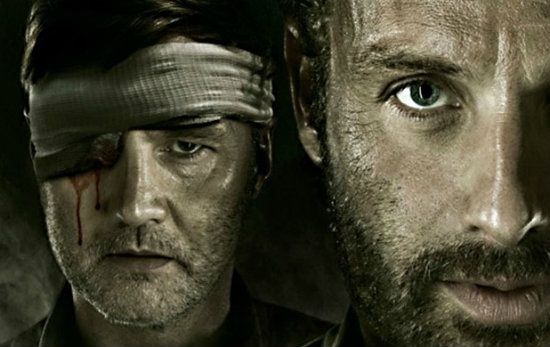
I finally picked back up in season three of The Walking Dead, and as I’ve continued reflections during Lent and now Holy Week, season three is blowing my mind in a ton of ways. Spoiler alert: I’m through the mid-season finale, so if you’re catching up like me and aren’t quite there yet, wait to read on.
As I write this it’s late Maundy Thursday. According to the church calendar, this is the night where the Last Supper takes place, where Jesus, having all authority, lets go of all power, washes his enemy’s feet, and is willingly arrested. Tonight is the beginning of the end.
Knowing this, on top of just how enthralling the show is in it’s own right, I haven’t been able to stop watching tonight. Episodes 5 and 6 were in my opinion the best of the show to this point. And in them, I’ve never seen a clearer portrayal of the two ways of life presented in the Passion narrative: the way of power and the way of suffering.

The Way of Power
On the one hand, there is the man known as simply “The Governor.” He rules his Romanesque town of Woodbury with a cunning tongue and the pretense of civility. Yet behind his silver tongue and civilized town standards lies a tyrant who seeks to gain power over death. The experiments on the dead and dying to understand what makes people turn, the propaganda of honorable deaths that were actually murders, and even the Colossieum in which the Walkers – the embodiment of death – are used as violent entertainment; the way of power, the way of Empire, is to manipulate death to maintain control.
This was seen most clearly in the Gladiator game in Episode 5. Walkers, the image of death itself, are turned into a way of entertainment, of pleasing the masses, and of indoctrinating them into believing that there is nothing to fear. What Andrea, who was formerly in another eay, describes as “barbaric,” the Governor describes the games as simply a “way to blow off steam.” The way of power controls death for its own ends and purposes, a means to manipulate and dominate people into submission.
Yet as the Colossiuem game concludes, we return immediately to the prison, where we are met with Daryl leaving a flower at a grave. There is another way, a way in which death returns us to who we truly are, in the full weight and glory of our humanity.
The Way of Suffering
As we are being introduced to Woodbury, we are also mourning the loss of Lori through the eyes of Rick. This is Rick’s first true experience with the death of a loved one (Shane, while still close, was Rick’s choice). While the way of power laughs and cheers at death, the way of suffering enters into it. Rick literally and figuratively descends into the “tombs” of the prison (as some characters have described the lower cells), his will broken as he finally comes to grips with his own inability to control life. He wrestles with the embodiment of death to the heart of the tomb, where he faces the one responsible, in a way, for taking his wife’s life. Where Lori was pregnant with new life, this Walker is pregnant with death.
In the heart of the tomb, a phone rings; an omniscient outside voice offers hope. Lingering in the room where his greatest suffering took place, with the walker who stole his wife just a few feet away, Rick must confront and embrace his suffering. In voicing the reality of his pain and acknowledging his inability to control and prevent death, Rick finds redemption. He emerges from death to embrace new life in his daughter Judith. (Judith, interestingly enough, is the heroine from the non-canonical Book of Judith, who used her weak position as a widow to gain access to and overthrow the tyrannical leader of Israel’s oppressors).
The Way of Jesus
And then we have Jesus, who this night, in the face of the Empire, willingly lays down his life, embracing death. At the hands of the Romans, and the “governor” Pontius Pilate, he makes no protest, but willingly enters into death. And, in embracing suffering and death, Jesus emerges from the Tomb carrying with Him new life.
The way of power was what people expected, all the way up until His arrest; Peter swings his sword before Jesus reprimands him: “those who use the sword will die by the sword” (Matthew 26:52).
The way of suffering is the way of Jesus. And it is the way we who follow Jesus must take as well. Paul, quoting the earliest of church creeds, would put it this way:
“Have the same mindset as Christ Jesus… He humbled himself by becoming obedient to death – even death on a cross.”
